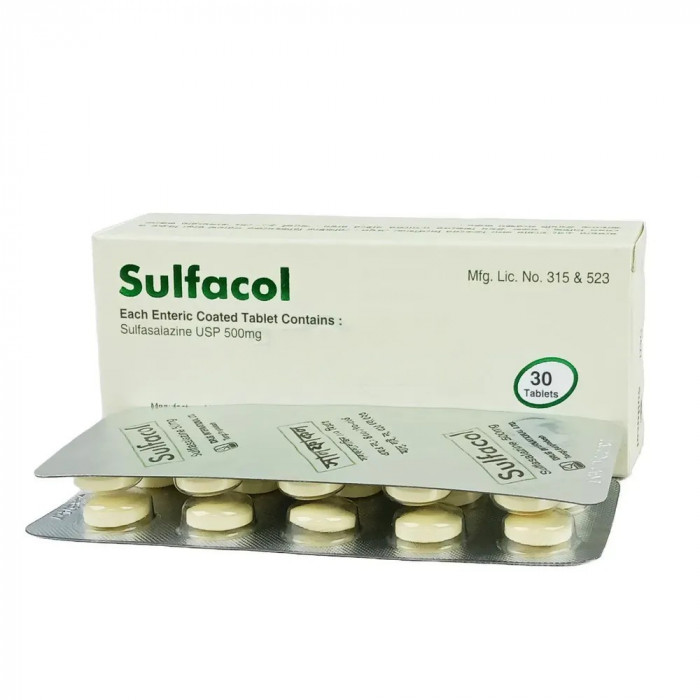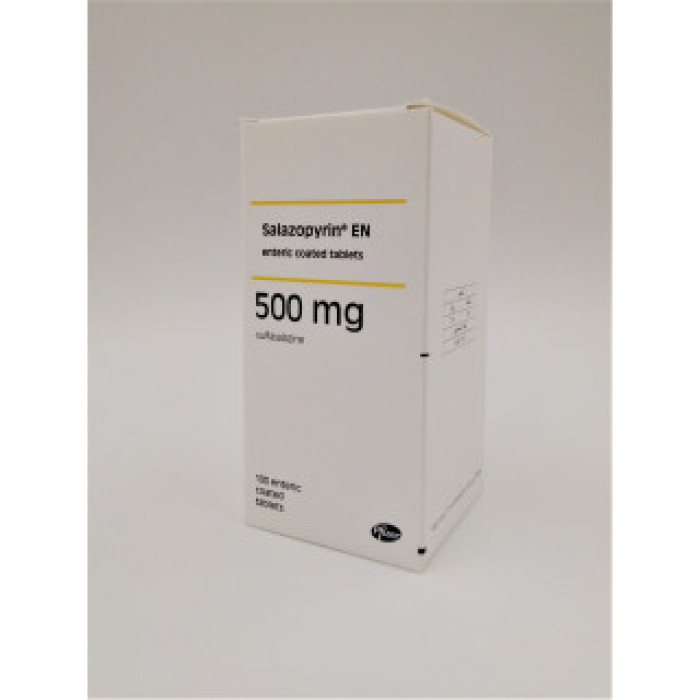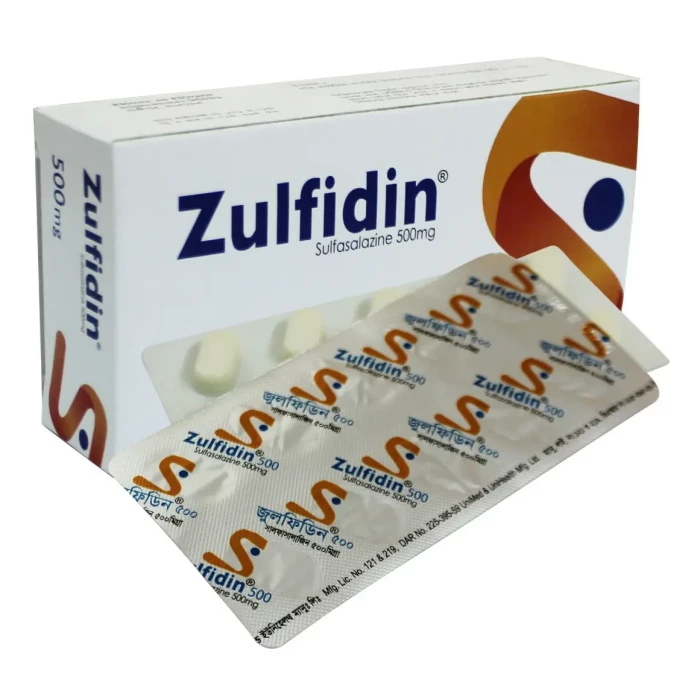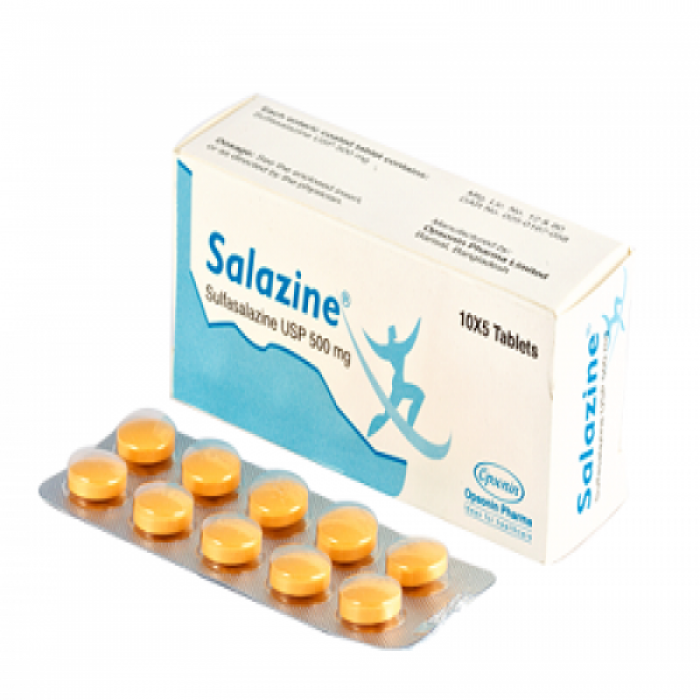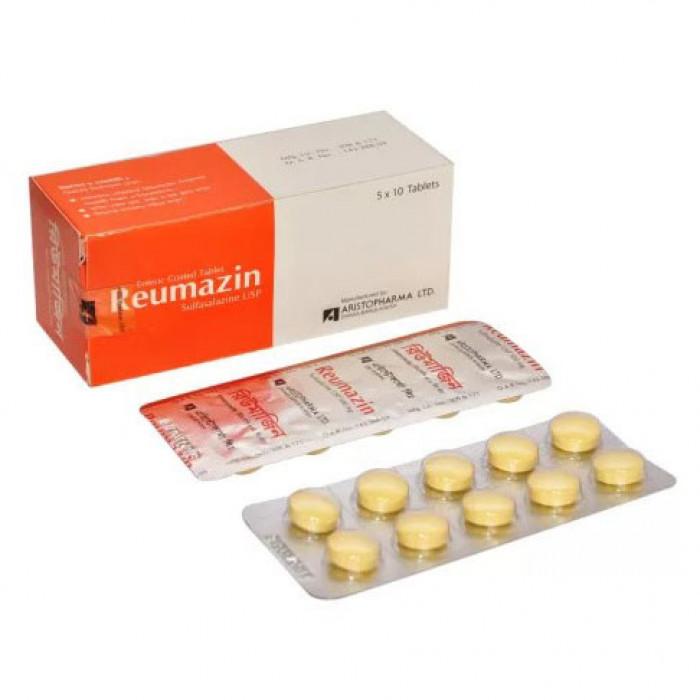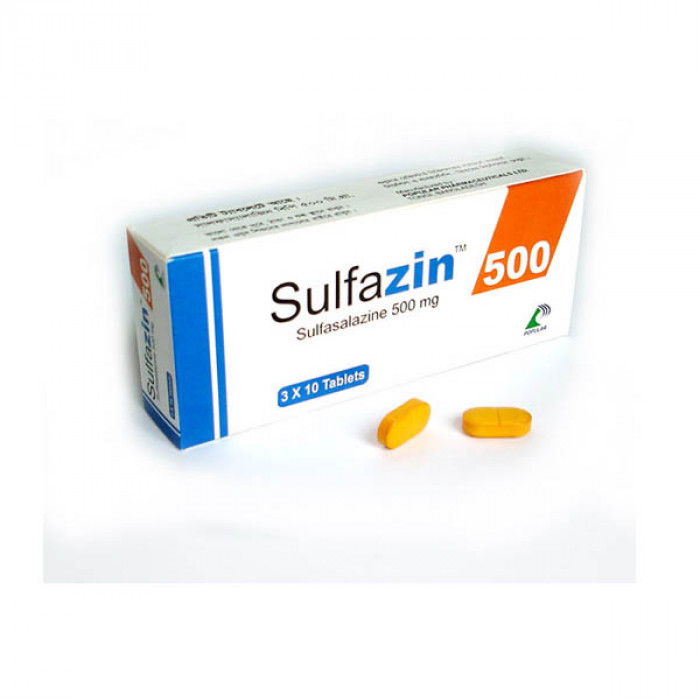
✔ 100% Authentic Product
👁️ Currently Viewing 2866
Sulfazin 500mg Tablet 10pcs
Sulfasalazine 500 is used for the treatment of Ulcerative colitis, Crohn's disease, Rheumatoid arthritis, Ankylosing spondylitis, Psoriatic arthritis, and Juvenile idiopathic arthritis.
Discount
Price: ৳ 50
MRP:
৳
53
6%
Off

100% Genuine Products, Guaranteed

Safe & Secure Payments, Always

Fast, Secure & Efficient Delivery

Proper Packaging
 Cash on Delivery - All over Bangladesh
Cash on Delivery - All over Bangladesh Regular Delivery - 12-24 Hours, Dhaka City* Charge Tk.39-59
Regular Delivery - 12-24 Hours, Dhaka City* Charge Tk.39-59 Regular Delivery - 24-48 Hours, Other Cities* Charge Tk.99-110
Regular Delivery - 24-48 Hours, Other Cities* Charge Tk.99-110
 ফ্রি ডেলিভারিঃ - ৯৯৯ টাকা+ অর্ডারে, ঢাকা
শহরে
ফ্রি ডেলিভারিঃ - ৯৯৯ টাকা+ অর্ডারে, ঢাকা
শহরে ফ্রি ডেলিভারিঃ - ২৯৯৯ টাকা+ অর্ডারে, ঢাকার
বাহিরে
ফ্রি ডেলিভারিঃ - ২৯৯৯ টাকা+ অর্ডারে, ঢাকার
বাহিরে
100% Genuine Products, Guaranteed
Safe & Secure Payments, Always
Fast, Secure & Efficient Delivery
Proper Packaging
 Cash on Delivery - All over Bangladesh
Cash on Delivery - All over Bangladesh Regular Delivery - 12-24 Hours, Dhaka City* Charge Tk.39-59
Regular Delivery - 12-24 Hours, Dhaka City* Charge Tk.39-59 Regular Delivery - 24-48 Hours, Other Cities* Charge Tk.99-110
Regular Delivery - 24-48 Hours, Other Cities* Charge Tk.99-110 ফ্রি ডেলিভারিঃ - ৯৯৯ টাকা+ অর্ডারে, ঢাকা
শহরে
ফ্রি ডেলিভারিঃ - ৯৯৯ টাকা+ অর্ডারে, ঢাকা
শহরে ফ্রি ডেলিভারিঃ - ২৯৯৯ টাকা+ অর্ডারে, ঢাকার
বাহিরে
ফ্রি ডেলিভারিঃ - ২৯৯৯ টাকা+ অর্ডারে, ঢাকার
বাহিরে
✅ Description:
Sulfazin 500 contains Sulfasalazine, a medicine classified under Aminosalicylates. It is commonly used to treat inflammatory bowel diseases such as Ulcerative Colitis, Crohn’s disease, and rheumatoid arthritis.
Ulcerative Colitis is an inflammatory condition affecting only the large intestine (colon and rectum). It causes inflammation of the bowel lining, leading to symptoms like abdominal pain and diarrhea, which may contain blood or mucus.
Crohn’s disease is an inflammatory condition that can affect any part of the digestive tract, from the mouth to the anus. It most commonly impacts the lower part of the small intestine and the beginning of the large intestine, with symptoms including abdominal pain and diarrhea, which may sometimes be bloody. The medication is also used to manage rheumatoid arthritis, which causes joint swelling, pain, and stiffness.

- Your doctor may recommend periodic blood, kidney, and liver function tests during treatment. It is essential to drink plenty of fluids to help prevent kidney-related issues.
- Before using Sulfazin 500, inform your doctor if you have conditions like porphyria (a rare blood pigment disorder), jaundice, kidney or liver problems, blood disorders, glucose-6-phosphate dehydrogenase deficiency, chronic infections, asthma, or arthritis.
- If you are pregnant or breastfeeding, consult your doctor before taking this medicine. Sulfazin 500 is not recommended for children under the age of 2.
Safety Advices

Alcohol
UNSAFE
Avoid consuming alcohol while taking Sulfasalazine as it may lead to unpleasant side effects.

Pregnancy
UNSAFE
Sulfasalazine should only be used during pregnancy if necessary. If prescribed, it is advised to increase folic acid supplementation under medical guidance.

Breastfeeding
CONSULT YOUR DOCTOR
Sulfasalazine passes into breast milk and is not recommended, especially if the baby is premature or at risk of jaundice, as it may cause kernicterus (high bilirubin levels) in newborns.

Driving
CAUTION
Sulfasalazine generally does not impair the ability to drive. However, if drowsiness occurs, refrain from driving.

Kidney
CONSULT YOUR DOCTOR
Sulfasalazine is not recommended for individuals with kidney disease or a history of kidney issues, as it may rarely lead to kidney inflammation.

Liver
CONSULT YOUR DOCTOR
Sulfasalazine is not recommended for individuals with liver disease or a history of liver problems, as it may cause hepatitis (liver inflammation) in rare cases.
✔️ Uses of Sulfazin 500
- Rheumatoid arthritis
- Ulcerative colitis
- Crohn’s disease
- Ankylosing spondylitis
✔️ Benefits of Sulfazin 500
- Sulfazin 500 functions by reducing inflammation in the colon. It works by inhibiting the production of prostaglandins, chemicals responsible for controlling inflammation.
- This action helps alleviate inflammation in various areas, including the joints, skin, and intestines.
- As a result, it is effective in treating a broad range of conditions such as ulcerative colitis, Crohn's disease, rheumatoid arthritis, ankylosing spondylitis, psoriatic arthritis, and juvenile idiopathic arthritis.
- It is important to note that Sulfazin 500 is not a pain reliever but an anti-inflammatory medication designed to target the underlying inflammation in these conditions.
✔️ Ulcerative Colitis:
A chronic inflammatory condition affects the bowels, causing irritation, inflammation, and ulcers in the lining of the large intestine (colon).
✔️ Crohn’s Disease:
A type of inflammatory bowel disease (IBD) marked by persistent inflammation of the digestive tract, which can affect any part of the gastrointestinal system.
✔️ Psoriasis:
A chronic skin condition where skin cells multiply at an accelerated rate, resulting in raised, red patches covered with silvery-white scales.
✔️ Rheumatoid Arthritis and Ankylosing Spondylitis:
Common rheumatic diseases that cause inflammation of the joints and spine. They lead to chronic pain, stiffness, and inflammation, which can progressively result in disability if untreated.
✔️ Dosage Guidelines for Sulfasalazine:
Adult Dose
Oral (Inflammatory Bowel Disease):
- Initial Dose: 1-2 g, four times daily until remission.
- Maintenance Dose: 2 g/day in divided doses.
Oral (Rheumatoid Arthritis):
- Initial Dose: 500 mg daily during the first week.
- Increase the dose by 500 mg weekly.
- Maximum Dose: 3 g/day in 2-4 divided doses.
Rectal (Inflammatory Bowel Disease):
- Dose: 0.5-1 g in the morning and at night, either alone or alongside oral treatment.
Hepatic Impairment:
- Avoid use.
Child Dose
Oral (Inflammatory Bowel Disease):
- Children >2 years: 40-60 mg/kg/day in divided doses.
- Maintenance Dose: 20-30 mg/kg/day in divided doses.
Oral (Rheumatoid Arthritis):
- For polyarticular juvenile rheumatoid arthritis (children >6 years):
- Dose: 30-50 mg/kg/day in two divided doses.
- Start with 1/4 to 2/3 of the expected maintenance dose and increase weekly to reach the maintenance dose in one month.
- Maximum Dose: 2 g/day.
Rectal (Inflammatory Bowel Disease):
- Ages 5-8 years: 500 mg twice daily.
- Ages 8-12 years: 500 mg in the morning and 1 g at night.
- Ages 12-18 years: 1 g twice daily.
✔️ Instructions for Use: Sulfazin 500
- Take Sulfazin 500 exactly as advised by your physician.
- Swallow the tablet whole with water. Do not crush or chew the tablet.
- The dosage and duration will be determined by your doctor based on your age, body weight, and medical condition.
✔️ Interaction:
The interaction with alcohol is unknown, so it's advised to consult your doctor before consuming alcohol while taking Sulfasalazine.
Several medications could potentially interact with Sulfasalazine, including:
- Methotrexate
- Digoxin
- Insulin
- Diclofenac
- Azathioprine
- Folic Acid
- Etodolac
- Glimepiride It’s important to discuss your current medication list with your doctor to assess these interactions and adjust dosages or medications if necessary.
- Hematologic toxicity: Individuals with blood disorders should avoid Sulfasalazine due to the increased risk of serious side effects.
- Liver disease: If you have liver problems, your doctor may monitor liver function closely and adjust the dose.
- Kidney diseases: Similarly, with pre-existing kidney issues, close monitoring is required, and dose adjustments might be necessary.
There is no specific information available regarding food or lab interactions for Sulfasalazine, so it's best to follow the advice of your healthcare provider.
✔️ Contraindications
Hypersensitivity to Sulfasalazine, its metabolites, sulfonamides or salicylates, patients with intestinal or urinary obstruction, and porphyria.
✔️ Precautions & Warnings
- Pregnancy: Sulfasalazine is generally considered safe during pregnancy, but you should discuss its use with your doctor, particularly if planning to conceive. Your doctor may monitor you more closely, and you may be advised to take additional folic acid or iron supplements to prevent deficiencies, as Sulfasalazine can lower folic acid levels.
- Breastfeeding: Sulfazin 500 should be avoided in breastfeeding mothers because it passes into breast milk and can cause jaundice and brain problems in infants younger than 2 years.
- Allergic Reactions: If you have an allergy to sulfa drugs (such as sulfonamide antibiotics), you may be at risk for serious skin allergies, including urticaria or even severe reactions like Stevens-Johnson syndrome. Always inform your doctor of any drug allergies.
- Effects in Men: Sulfasalazine can lower sperm count in men, but this effect is reversible after discontinuing the medication. If you are planning for fatherhood, you should talk to your doctor.
- Other Health Conditions: If you experience asthma, wheezing, fever, difficulty breathing, severe skin rash, unusual bleeding, sore throat, unexplained bruising, or other symptoms of infection, contact your doctor immediately. These could be signs of a serious reaction to the medication.
- Urine and Skin Changes: It is normal for Sulfasalazine to cause your urine, contact lenses, tears, and skin to take on a yellow or orange hue. This is harmless and temporary. It can also increase sensitivity to sunlight, so you should take precautions to avoid sunburns.
✔️ Storage Conditions:
- Keep Sulfazin out of reach of children
- Store below 25°C
⚠️Disclaimer:
At ePharma, we’re committed to providing accurate and accessible health information. However, all content is intended for informational purposes only and should not replace medical advice from a qualified physician. Please consult your healthcare provider for personalized guidance. We aim to support, not substitute, the doctor-patient relationship.




